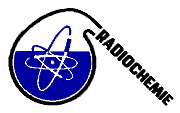Speaker
Mr
Nikolay Aksenov
(Flerov Laboratory of Nuclear Reactions, Joint Institute for Nuclear Research)
Description
In order to optimize conditions for isolation and study of chemical properties of Rf and Db [1], we investigated sorption of their lighter homologues Ti, Zr, Hf, Nb and Ta, from HF solutions in water-miscible organic solvents using the Dowex 50x8 cation exchange (CIX) and AG 1x8 anion exchange (AIX) resins. We studied dependence of sorption on concentration of HF and acetone. We found that using the AIX resins the distribution coefficients of Ti, Zr, Hf and Nb increased and those of Ta decreased with increasing content of acetone in HF solutions.
The results indicated that in concentrated (> 3 M) HF solutions containing acetone, group 4 elements formed MF73– (M = Ti, Zr, Hf) complexes whose stability decreased in reverse order of sorption Zr > Hf > Ti. Obtained results are in agreement with previously reported data [2, 3] where using CIX chromatography and HCl-HF mixed solutions group 4 elements were separated and eluted in order of Zr > Hf > Ti > Th.
Under the same conditions, group 5 elements predominately formed complexes NbOF52– and TaF72– with stability considerably different, which decreased in sequence Nb > Ta. We found optimal conditions for separation of the elements using CIX and AIX chromatography. The advantages of studying chemical properties of Rf and Db in aqueous HF solutions mixed with organic solvents are briefly discussed.
This work was supported by the RFBR (grant No. 09-03-12029-ofi_m).
1. S. N. Dmitriev et al., Mendeleev Communications. 15, 1, 1-4 (2005).
2. N.V. Aksenov et al. Radiochemistry 50, 4, 381, (2008).
3. N.V. Aksenov In: Abstracts of the XV International Conference in Fundamental Sciences “Lomonosov-2008”, Moscow State University, April 8-11, Chemistry, 543, (2008).
Primary author
Mr
Nikolay Aksenov
(Flerov Laboratory of Nuclear Reactions, Joint Institute for Nuclear Research)
Co-authors
Dr
Alexander Novgorodov
(Dzhelepov Laboratory of Nuclear Problems, Joint Institute for Nuclear Research)
Dr
Dmitriy Filosofov
(Dzhelepov Laboratory of Nuclear Problems, Joint Institute for Nuclear Research)
Mr
Genadiy Starodub
(Flerov Laboratory of Nuclear Reactions, Joint Institute for Nuclear Research)
Dr
Gospodin Bozhikov
(Flerov Laboratory of Nuclear Reactions, Joint Institute for Nuclear Research)
Mr
Jin Jon Sun
(Dzhelepov Laboratory of Nuclear Problems, Joint Institute for Nuclear Research)
Dr
Nikolay Lebedev
(Dzhelepov Laboratory of Nuclear Problems, Joint Institute for Nuclear Research)
Prof.
Sergey Dmitriev
(Flerov Laboratory of Nuclear Reactions, Joint Institute for Nuclear Research)
Mr
Valeriy Radchenko
(Dzhelepov Laboratory of Nuclear Problems, Joint Institute for Nuclear Research)

